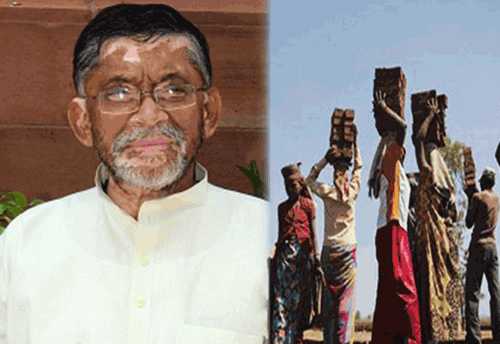No move by Centre to fix national floor rate of Rs 18,000/ month for minimum wages: Labour Ministry
Updated: Sep 06, 2017 11:42:22am

No move by Centre to fix national floor rate of Rs 18,000/ month for minimum wages: Labour Ministry
New Delhi, Sept 6 (KNN) There is no move by the Centre to fix a national floor rate of Rs 18,000/ month for minimum wages or to revise the formula of fixing wages by increasing the number of family members from three to six, the statement issued by the Labour Ministry on Tuesday clarified.
“It is clarified that the Central Government has not fixed or mentioned any amount as “national minimum wage” in the Code on Wages Bill 2017. The apprehension that minimum wage of Rs 18,000 per month has been fixed for all employees is thus incorrect, false and baseless. The minimum wages will vary from place to place depending upon skill required, arduousness of the work assigned and geographical location,” the Labour Ministry said in a release.
Santosh Gangwar, who earlier was MoS Finance, took charge of the Labour Ministry on Monday replacing Bandaru Dattatreya.
Dattatreya had announced the setting up of a committee to review the wage fixation formula on August 3.
The Labour Ministry, however, clarified that the Code on Wages Bill 2017, clearly stated that the Centre before fixing the national minimum wage, may obtain the advice of the Central Advisory Board, having representatives from employers and employees. “Therefore, the code provides for a consultative mechanism before determining the national minimum wage,” it said.
Over a revised methodology for calculation of minimum wages by enhancing the units from three to six, the Ministry further said, “It was purely a demand raised by trade unions in the recent meeting of the Central Advisory Board on Minimum Wages. However, it is clarified that such proposal is not part of the Code on Wages Bill,” it said.
The release said that at present, the provisions of the Minimum Wages Act and the Payment of Wages Act do not cover substantial number of workers, as the applicability of both these Acts is restricted to the Scheduled Employments / Establishments.
However, the new Code on Wages will ensure minimum wages to one and all and timely payment of wages to all employees irrespective of the sector of employment without any wage ceiling.
A concept of statutory National Minimum Wage for different geographical areas has been introduced. It will ensure that no State Government fixes the minimum wage below the National Minimum Wages for that particular area as notified by the Central Government.
The proposed payment of wages through cheque or digital/ electronic mode would not only promote digitization but also extend wage and social security to the worker. Provision of an Appellate Authority has been made between the Claim Authority and the Judicial Forum which will lead to speedy, cheaper and efficient redressal of grievances and settlement of claims, said the Ministry.
Also, penalties for different types of violations under this Code have been rationalized with the amount of fines varying as per the gravity of violations and repeat of the offences. Provision of compounding of offences has been made for those which are not punishable by a penalty of imprisonment.
The Code on Wages Bill 2017 was introduced in the Lok Sabha on August 10, and subsumes four existing laws -- the Minimum Wages Act, 1948; the Payment of Wages Act, 1936; the Payment of Bonus Act, 1965; and the Equal Remuneration Act, 1976.











